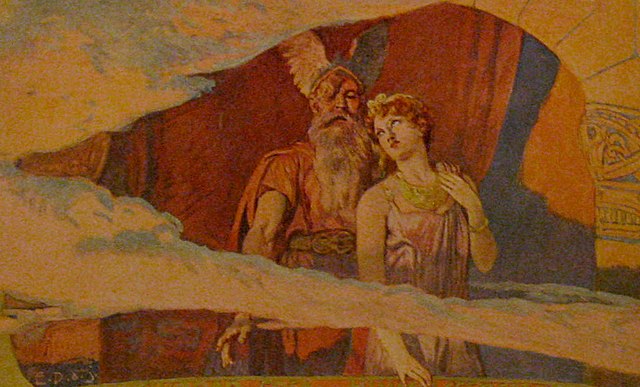Höðr is a god in Norse mythology. The blind son of Odin and Frigg, he is tricked and guided by Loki into shooting a mistletoe arrow which was to slay the otherwise invulnerable Baldr.
Loki tricks Höðr into shooting Baldr
In Saxo's version of the story Høtherus meets wood maidens who warn him that Balderus is a demi-god who can't be killed by normal means.
Frigg is a goddess, one of the Æsir, in Germanic mythology. In Norse mythology, the source of most surviving information about her, she is associated with marriage, prophecy, clairvoyance and motherhood, and dwells in the wetland halls of Fensalir. In wider Germanic mythology, she is known in Old High German as Frīja, in Langobardic as Frēa, in Old English as Frīg, in Old Frisian as Frīa, and in Old Saxon as Frī, all ultimately stemming from the Proto-Germanic theonym *Frijjō. Nearly all sources portray her as the wife of the god Odin.
Frigg sits enthroned and facing the spear-wielding goddess Gná, flanked by two goddesses, one of whom (Fulla) carries her eski, a wooden box. Illustrated (1882) by Carl Emil Doepler.
Godan and Frigg look down from their window in the heavens to the Winnili women in an illustration by Emil Doepler, 1905
"Wodan Heals Balder's Horse" by Emil Doepler, 1905
The goddess Frigg and her husband, the god Odin, sit in Hliðskjálf and gaze into "all worlds" and make a wager as described in Grímnismál in an illustration by Lorenz Frølich, 1895






